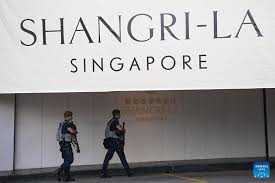Singapore – May 31, 2025 – The 22nd Shangri-La Dialogue, Asia’s premier defence and security summit, officially opened today in Singapore amidst a backdrop of simmering geopolitical tensions. Drawing together high-level defence officials, ministers, and security experts from nearly 50 countries, the annual event, organised by the International Institute for Strategic Studies (IISS), serves as a crucial platform for frank discussions on the region’s most pressing security challenges.
The Shangri-La Hotel, the dialogue’s namesake venue, is once again a hub of intense diplomatic activity. Representatives from 47 nations are in attendance, including 40 ministerial-level delegates and 20 chiefs of defence forces, underscoring the forum’s significance in shaping regional and global security narratives.
The dialogue commenced this evening with a keynote address by French President Emmanuel Macron. His speech, a notable first for a European leader at this Asian security forum, outlined France’s strategic vision for the Indo-Pacific and emphasised the importance of international cooperation and a rules-based order. This coincides with Singapore and France commemorating 60 years of diplomatic relations.
A key focus of the weekend’s discussions is anticipated to be the evolving dynamics in the Indo-Pacific, particularly concerning US security policies and China’s increasingly assertive stance in the region. US Defence Secretary Pete Hegseth is scheduled to speak on Saturday, offering America’s updated ambitions for Indo-Pacific security under the new Trump administration. Observers will be closely watching his remarks, given the broader global uneasiness about some of President Trump’s disruptive foreign policy approaches, not least those related to trade.
Conversely, a delegation from the Chinese People’s Liberation Army’s National Defense University is attending, though China’s Defence Minister is notably absent this year. This decision marks a return to a more cautious diplomatic posture from Beijing, and it means direct ministerial-level bilateral talks between US and Chinese defence chiefs, a common feature of previous dialogues, will not occur. Nevertheless, the presence of Chinese delegates ensures their perspectives on issues such as Taiwan and the South China Sea will still be heard.
Beyond the major power dynamics, other critical topics slated for discussion include enhancing security cooperation for a stable Asia-Pacific, managing proliferation risks across the region, and addressing the growing challenges in cyber, undersea, and outer-space defence. The Russian-Ukraine conflict and its global implications are also expected to feature prominently, as are the potential impacts of recent sweeping US tariffs on global stability.
The Shangri-La Dialogue has, since its inception in 2002, provided a valuable, open, and neutral platform for the exchange of perspectives on defence and security issues. Whilst formal plenary sessions offer public insights into policy positions, much of the crucial diplomacy unfolds in the numerous bilateral meetings held behind closed doors on the sidelines. These private conversations are often where the groundwork for de-escalation, cooperation, and understanding is truly laid.
As the dialogue continues through to Sunday, the world’s defence and security leaders will be working to navigate an increasingly complex and multipolar security landscape, seeking common ground and fresh approaches to ensure stability in a competitive world.
newshub finance




Recent Comments